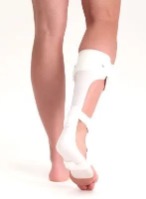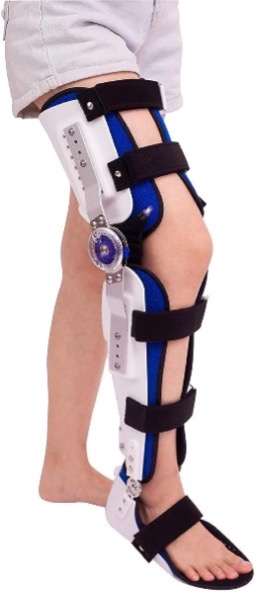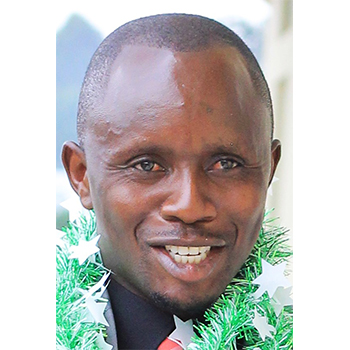
Medical student and
organizer of the operations
When our Interplast team was chauffeured through the beautiful countryside around Goma on Sundays during our missions in 2015 to 2019, we saw paralyzed men in many villages sliding around on the streets and begging, with no one donating a pair of leg braces and crutches – or a wheelchair.
These poor souls, condemned through no fault of their own to a life in the squalor of the streets, would not leave my mind. Their mothers had refused them the oral polio vaccine “because the whites want to use it to exterminate the blacks.” And then, in the myth-riddled society of the Congo, it is believed “that their mother slept with the devil.”
Since I ordered a large container of beds and equipment for REHEMA Hospital in China in 2024, I bought 30 wheelchairs (for $100), leg braces ($50) and crutches ($5) at the same time. A quickly established 5th organization of the disabled (the idea that cooperation makes you stronger does not go into their heads either) ADHC rented a house for a workshop for leg splints and leg prostheses, and since then has also been concerned with the longest possible surgical treatment of as many disabled people as possible.
Pro-Interplast in Seligenstadt and the Lemperle Foundation in Kelkheim have been gratefully financing these operations on hips and knees and feet with good results (see). Unfortunately, the orthopedic INTERPLAST teams cannot be expected to carry out operations at the moment due to the surrounding rebels.
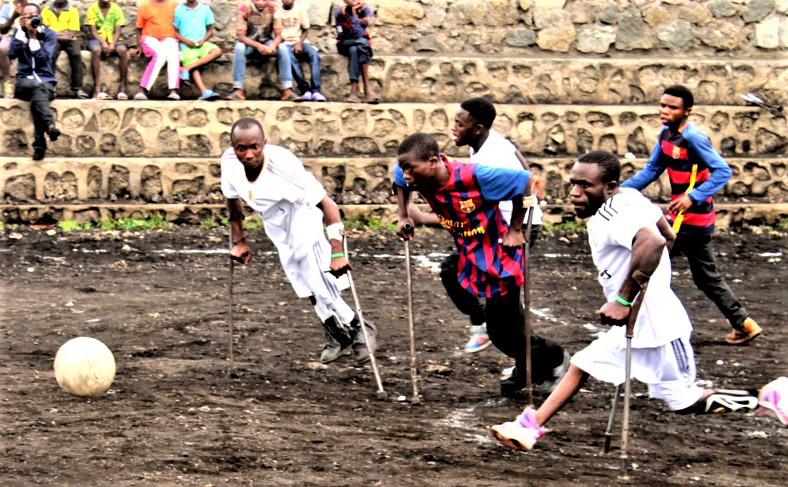
Real Madrid against Barcelona: There's one thing you can't take away from the black disabled: their eternally cheerful disposition and broad laughter - and never quarrelling with their hard fate!
David with a freshly cast baby with clubfeet: at this age, ligaments and bones are still malleable, so they can be straightened in a few weeks to months with changing casts without surgery.
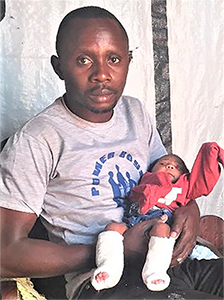
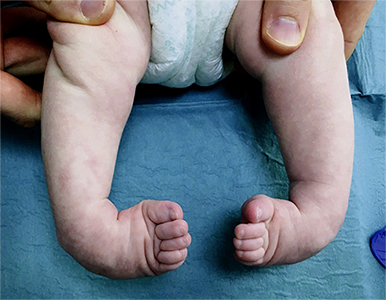
The others have congenital clubfeet that were not redressed in infancy because this effective therapy is not known to rural doctors in the Congo.
The other are those with congenital malformations such as dislocated femoral heads and clubfeet, and the third are the many young people with polio whose legs are stuck in metal splints and are thrown forward when they walk.
We straighten clubfeet in plaster casts or plastic splints shortly after birth and operate on all other patients as early as possible. That's why we are also thinking about annual orthopaedic interplast teams and a separate 2nd floor for orthopaedics, as there is only one functioning department for such operations in Goma.
We offered both young people a double transtibial amputation with optimal prosthetic fitting: However, they did not have the courage to change their life by standing and walking and decided to use a wheelchair! If wheelchairs were not as expensive in Goma as they are here - Goma would probably be the wheelchair city of Africa: almost all double paralyzed people would have opted and would still opt for a wheelchair.
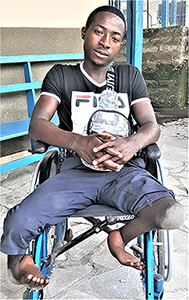
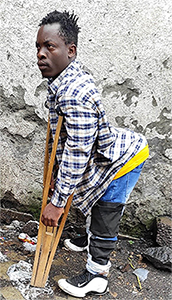
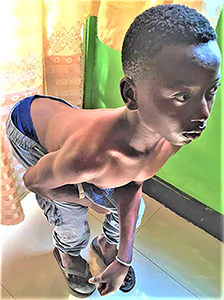
Almost every week we receive a similar clip from the Goma area, showing adults who have been sliding around on the floor since birth or since their polio at 3-5 years old, because their parents cannot save money for leg braces and crutches (approx. $500) or a wheelchair ($600) - and the richer environment does not have the word “compassion” in its vocabulary.
How can we turn a blind eye to this unconscionable misery or help these brave people to live at our eye level with a donation of €200 for a wheelchair or prefabricated leg braces and adjustable crutches from China?
Unfortunately, a pallet from China costs just as much for transportation and bribes to customs officers and officials involved - but in the end it is a third of the cost of these devices locally.
I founded an organization on 20.3.2023 with 5 politically committed disabled people (see picture with me in the back in the middle): ADHC
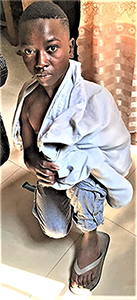

During 5 Interplast-Germany missions in Goma, DRCongo, between 2015 and 2019, we also got to know a group of 6 young polio-paralyzed people, the “Power Boys”, whom the then Bishop of the Nazarenes, Reverend Balibango, had picked up from the streets, where they eked out their lives with petty theft and begging because they were rejected by their families “as a burden”. He made sure that they passed their A-levels at the “Dr. Zanner Institute”, a German school run by a missionary director from Bad Homburg, but now had no money to study.
In the harsh Congolese society, paralyzed people are still considered outcasts because “their mother slept with the devil” and they carry an evil spirit within them. The mothers are to blame for their suffering because they refused to vaccinate them against polio “because the whites want to wipe out the blacks”. The Congo is still full of these old myths.
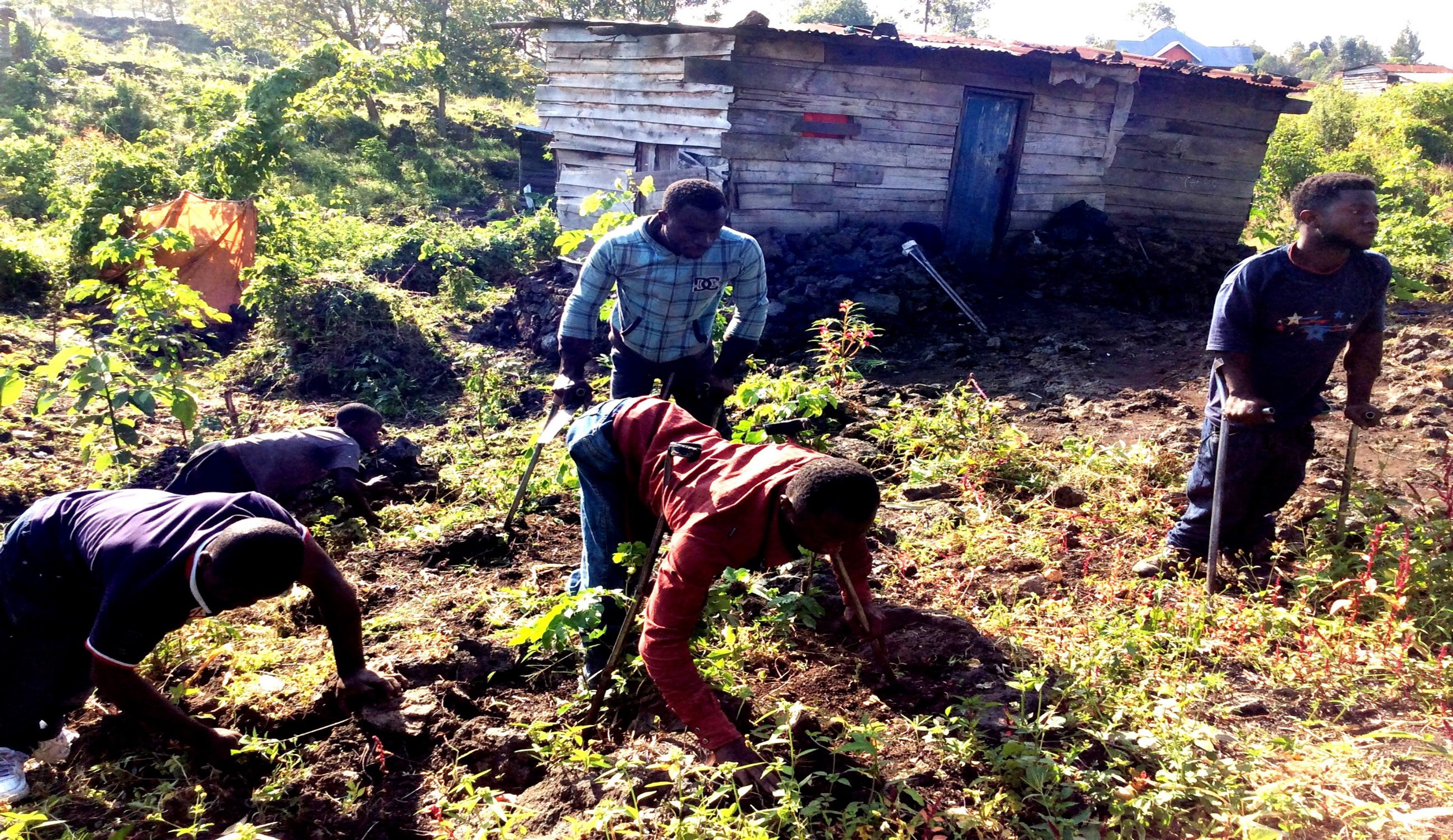
1. my family financed the studies of the 6 Power Boys with $5000-$10,000 each. today they are medical students, health or customs officials, shoemakers, NGO consultants and lawyers and as students they have the prospect of a better life in the Congo. Until then, they had lived in a self-built hut and mainly grew manioc (the tropical potato) and bananas.
5 of the 6 Power Boys studied - here “Public Health” - one learned shoemaking


2. Your example spread like wildfire in Goma and later also in distant towns such as Kindu and Lubambashi, so that we are currently providing new leg braces, prosthetic legs or wheelchairs for more than 80 students and craftsmen with polio or amputations caused by war. By “we” I mean my eldest son Martin, who has generously taken on the financing of tuition fees or the establishment of handicraft businesses or small stores.
The poorest of these poor, however, are those who live as bilateral paraplegics in the villages, where they get no money for crutches, leg braces or even a wheelchair, but have been sliding around on the ground since their polio infection at the age of 3 to 5 and “earn” their meager living as beggars.
When I saw these pictures taken by Power Boy David, who wants to become an orthopaedic surgeon one day, I immediately ordered 20 wheelchairs in China, where they cost $130 instead of $600 in Goma, and had them brought to Goma in the container for the REHEMA hospital's interior fittings.

3. However, the main concern of these polio-paralyzed people is not so much their poor livelihood, but their recognition as equal and socially integrated fellow citizens. Of course, there are just as many intelligent and committed people among them as there are among healthy people. Elisha and Prince have already founded two small organizations, “Accessibility and Disabled Inclusion” (ADI) and “Voice of the African Child” (VAC), which suffer from a chronic lack of financial support because the word empathy with the poor seems to be unknown in the Congo.
However, since the first 5 committed people could not agree on an organization that would not only be active in Goma, but would also remain active as a recognized partner with a financial background with German foundations for long-term support after my departure, the 3 members Pascal Niyonzima (business economist), Jackson Byenda 1(IT specialist) and David Mbavu (medical student) founded the organization “Action et Developpement des Handicapes au Congo” (ADHC) in September 2023.
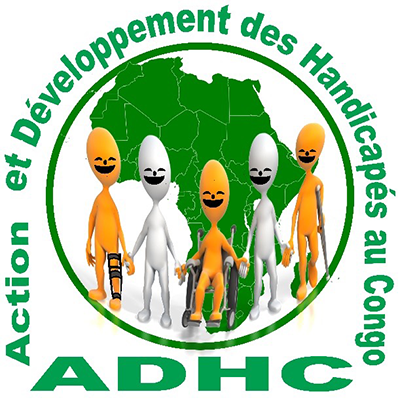
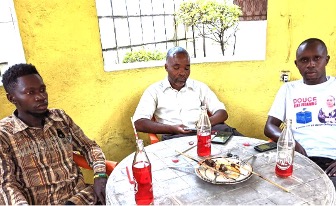
This was initially intended to establish and finance a workshop for the disabled for leg braces, prosthetic legs and wheelchairs and to set up an account for the tuition fees and business development of the disabled Gomas.
The new ADHC workshop for the disabled in Goma, where leg splints and prostheses are mainly manufactured.
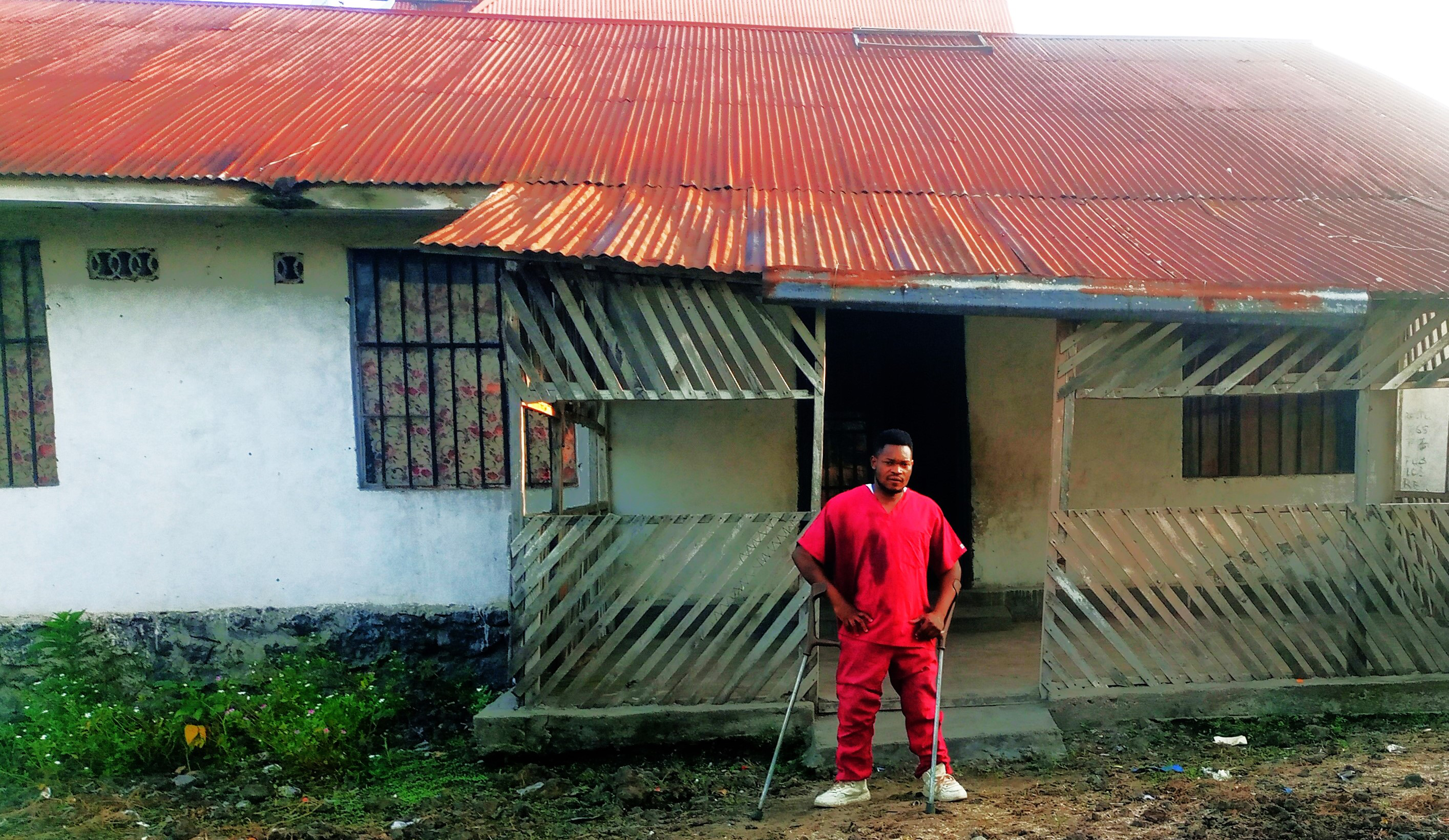
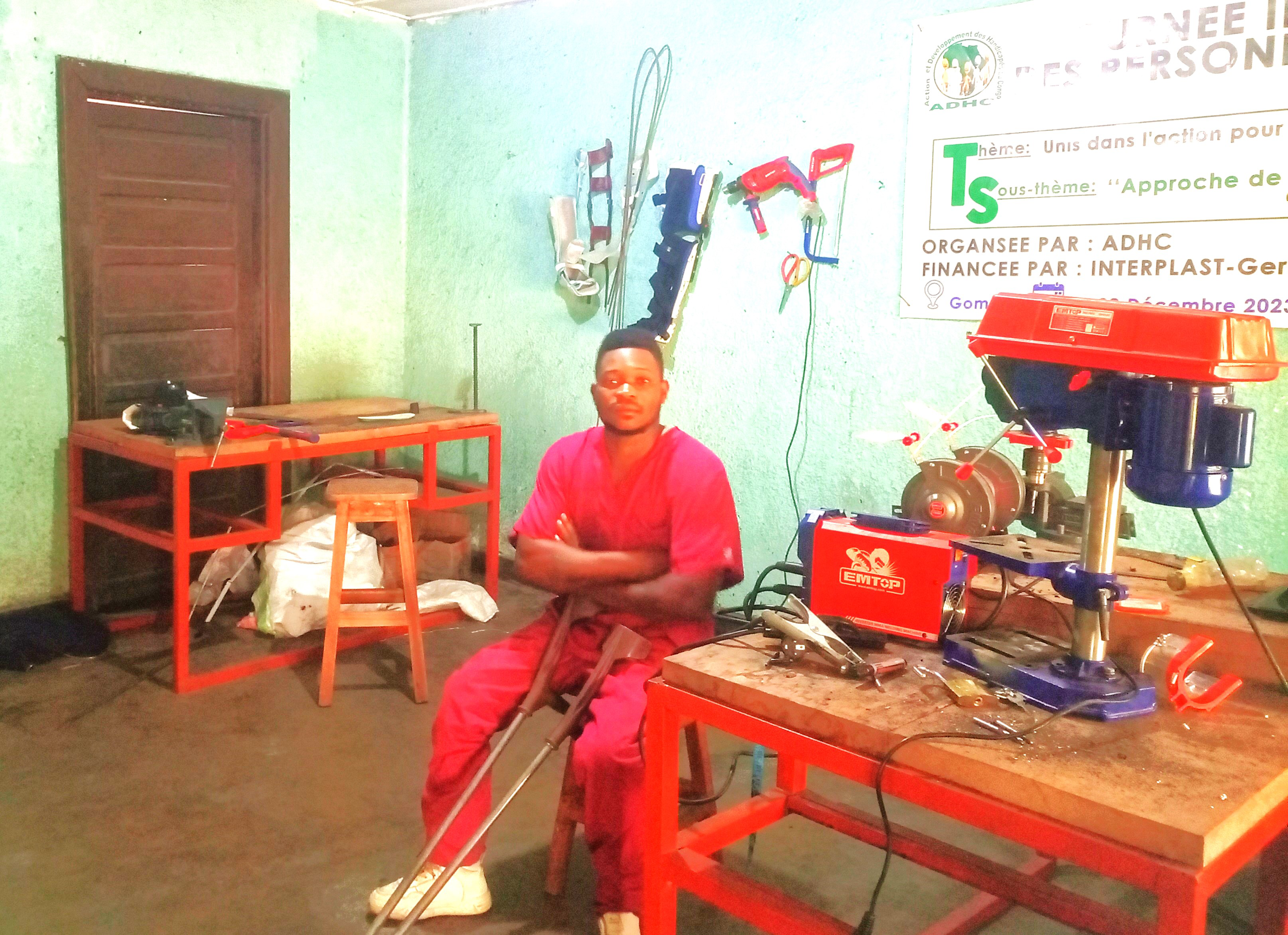
Jospin, a trained prosthesis maker with his economical tools.
Modern lightweight plastic splints for $30 and $100 from China, instead of $300 and $600 in Congo...can replace the heavy, often fracturing metal splints.
